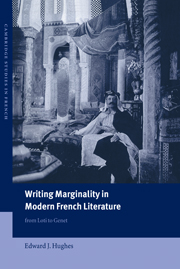Book contents
- Frontmatter
- Contents
- Acknowledgements
- Abbreviations
- Introduction
- Chapter One Without obligation: exotic appropriation in Loti and Gauguin
- Chapter Two Exemplary inclusions, indecent exclusions in Proust's Recherche
- Chapter Three Claiming cultural dissidence: the case of Montherlant's La Rose de sable
- Chapter Four Camus and the resistance to history
- Chapter Five Peripheries, public and private: Genet and dispossession
- Conclusion
- Notes
- Bibliography
- Index
Chapter Two - Exemplary inclusions, indecent exclusions in Proust's Recherche
Published online by Cambridge University Press: 22 September 2009
- Frontmatter
- Contents
- Acknowledgements
- Abbreviations
- Introduction
- Chapter One Without obligation: exotic appropriation in Loti and Gauguin
- Chapter Two Exemplary inclusions, indecent exclusions in Proust's Recherche
- Chapter Three Claiming cultural dissidence: the case of Montherlant's La Rose de sable
- Chapter Four Camus and the resistance to history
- Chapter Five Peripheries, public and private: Genet and dispossession
- Conclusion
- Notes
- Bibliography
- Index
Summary
MIRAGES OF DESIRE
If the conspicuous exotic in the works of Loti, Gauguin, and Segalen contrasts markedly with the Francocentric world of À la recherche du temps perdu, obsession with the Other is no less real in the novel. While Segalen delights in the preservation of a resistant difference, such irreducible alterity frequently awakens an aggressive frustration for Proust's Narrator. Yet desire in the Recherche also spawns its own exotic, as Proust recycles the hackneyed motifs that Loti and his generation handed down to him. Hence the Africanist nostalgia when he writes:
Like those mirages that encourage the traveller to continue walking in the desert, in the desert of life … a pair of blue-grey eyes, above a white bodice, gives us the mirage of an assuagement that renews our desire to press on.
[Comme ces mirages qui donnent au voyageur la force de marcher dans le désert, dans le désert de la vie … des yeux bleu gris, au-dessus d'un corsage blanc, nous donne le mirage d'un assouvissement qui nous redonne le goût de marcher.]
Given the ironic fluctuations in literary fashion, it is easy to overlook just how much Proust's generation was influenced by Loti. While his slide into obscurity for much of the twentieth century is not in question, David Sweetman rightly insists on Loti's ‘commanding influence’ in the closing years of the nineteenth century.
- Type
- Chapter
- Information
- Writing Marginality in Modern French LiteratureFrom Loti to Genet, pp. 41 - 70Publisher: Cambridge University PressPrint publication year: 2001



